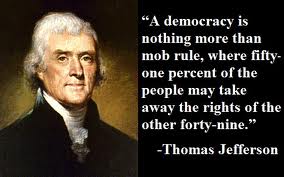Is “Democracy” Just Another Word for “Political Machine”?
 Jefferson’s sense of humor is evident in his use of overstatement about democracy as “mob rule,” a bit like the caricaturist who exaggerates so that people will see the point. He lived in small-town Colonial America when informed and independent citizens were free to weigh the issues. Principles were upfront.
Jefferson’s sense of humor is evident in his use of overstatement about democracy as “mob rule,” a bit like the caricaturist who exaggerates so that people will see the point. He lived in small-town Colonial America when informed and independent citizens were free to weigh the issues. Principles were upfront.
Today the problem of disenfranchisement is compounded when voters and candidates lose their own sense of right and wrong about issues. There is often no personally arrived at judgment that hasn’t been pre-spun and dumped into minds that haven’t begun to sort things out.
The machinery of getting elected takes over. Feel good, catchy slogans replace bona fide principles. Candidates seem deliberately vague and say what voters want to hear. As we know, the message is conveniently packaged in television commercials, postcards, robocalls, yard signs, and email blitzes.
 Money and organizational machinery determine the results. The thieves of democracy start to sound like Jefferson’s sense of mob rule. And once in office, incumbents know that voters will tend to reelect them.
Money and organizational machinery determine the results. The thieves of democracy start to sound like Jefferson’s sense of mob rule. And once in office, incumbents know that voters will tend to reelect them.
AP’s Connie Cass recently summed up the almost unfair advantage that seems to make a mockery of democracy: “It’s harder for challengers to sell themselves to voters. Incumbents wield tremendous advantages. They raise big bucks from special interests, use their congressional offices to send voters mass mailings, build ties to businesses and advocacy groups in their districts, and benefit from name recognition. They have staff members back home working to keep constituents happy.”
Political campaigner Laura Akers agrees with Cass, but asks “Once a person is in office, what does it really take to get them out? If they’re affiliated with a party, do members of that party vote blindly for the person even if they’re doing a bad job? Do voters take the time to truly educate themselves about the issues or simply mark the box for the incumbent because it’s a familiar name and easy decision? Are voters aware that parties are dumping loads of money into that person’s race to assist in keeping the office? Are voters swayed by the broad brush stroke attack ads into voting for or against a candidate rather than exploring the facts and learning the truth?”
Is there anything left of even the worst face of Jeffersonian democracy? we might ask. Sure, there are still a few political types here and there who attempt to sort things out, but what about the masses of people who supposedly form the electorate? Political machines and the media will make sure that they vote the way they’re supposed to. Mindless moderates are being had, aren’t they? The process of choosing candidates is in the hands of just a few people who control wealth, media, and power.
Exporting democracy to Third World countries often serves as a justification for attempting to help them to a better form of government. It’s guided our foreign policy for some time now. Supporting demonstrations within a country can force the issue. If the people choose unwisely, as they did in Egypt and the Ukraine, then more demonstrations are called for, but is this really democracy as Jefferson would have known it?
 Jefferson’s sense of humor is evident in his use of overstatement about democracy as “mob rule,” a bit like the caricaturist who exaggerates so that people will see the point. He lived in small-town Colonial America when informed and independent citizens were free to weigh the issues. Principles were upfront.
Jefferson’s sense of humor is evident in his use of overstatement about democracy as “mob rule,” a bit like the caricaturist who exaggerates so that people will see the point. He lived in small-town Colonial America when informed and independent citizens were free to weigh the issues. Principles were upfront. Money and organizational machinery determine the results. The thieves of democracy start to sound like Jefferson’s sense of mob rule. And once in office, incumbents know that voters will tend to reelect them.
Money and organizational machinery determine the results. The thieves of democracy start to sound like Jefferson’s sense of mob rule. And once in office, incumbents know that voters will tend to reelect them.